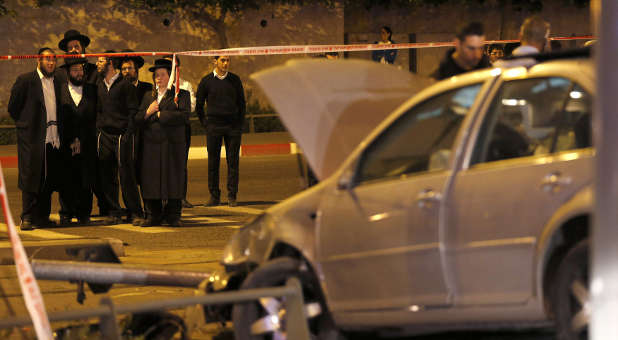MDA Life Savers: Israel’s Quiet Heroes
They’re everywhere. Ubiquitous.
The only thing worse and more pervasive than the terror attacks plaguing Israel is the fear and uncertainty that’s looming wider. With no end in sight, Israelis are finding new ways to go about their daily lives while avoiding putting themselves in danger.
People outside of Jerusalem are avoiding going to Jerusalem. People in Jerusalem are avoiding going into the Old City or Jerusalem Arab neighborhoods. But the avoidance of going to Jerusalem belies the fact that while there has been a high-proportion of attacks in Jerusalem, there have also been attacks in other major Israeli cities throughout Israel.
People in Tel Aviv, Hadera, Afula, Beersheba, Nazareth, Judea, Samaria, and others just to name a few have experienced them. The avoidance of Arab neighborhoods in Jerusalem highlights the fact that there are very few places within Jerusalem where Arabs don’t live, work, shop, or pass through on a daily basis. Avoiding Arabs in Jerusalem is a practical impossibility. I am reminded of my behavior in 2004 when I bravely decided to visit Israel amid a rash of bus bombings. I decided to walk on the opposite side of the street from buses so that if one blew up, I would not be next to it. That was silly, naïve and impractical, of course.
Proportionally however, Jerusalem is no more or less safe than anywhere else. It is Israel’s largest city and the city with the largest Arab population. Arguably, with little exception, Israelis are not necessarily safer in one city over another.
It’s sad to write this because I never like to overplay the fact that Israelis do live with a different—albeit not necessarily higher—level of risk than people in other countries. I never like to ask for money to help because of a threat or perceived threat. Sometimes that’s over played and disingenuous. But the threat is a reality and not ending any time soon.
The recent shooting attack by an Israeli Arab in the Beersheba bus station particularly shook much of Israel because Israel’s Bedouin population is generally considered loyal and they have a high proportion of military service. As a father whose children commute through Jerusalem’s bus station all the time, where a 72-year-old woman was attacked recently, admittedly this made me more uncomfortable sending my kids to school and work.
They’re everywhere.
Articles in print and online media about the rise of terrorism are commonly illustrated by photos of paramedics and ambulances on the scene of a specific incident or as a file photo for reference. The message is clear. Yes, there’s a threat. But, we also have among the world’s formidable ambulance and EMS service on call, 24/7, no matter what.
When there’s a threat, they are first on the scene, expertly trained and committed to their mission beyond imagination. Just as Israelis have become more careful, there’s comfort in knowing that Israel’s national ambulance and EMS service is there, ready to answer the call and dispatch Israel’s lifesavers.
Last week I attended a meeting with Israel’s Minister of Health, Rabbi Yakov Litzman. He described visiting a revered rabbi in a Jerusalem hospital last week when news came in of a shooting attack on a local bus. In minutes, he was down in the ER. Minutes later, the first ambulances started arriving. He spoke with awe about watching the paramedics treating the most severely injured, never giving up on a person even after they entered the hospital. He had never seen anything like it. The paramedics were operating with almost superhuman strength and resolve.
Clearly the paramedic’s dedicated hands were an extension of God’s arm. It’s no surprise as Israel, as a Jewish country, sanctifies and preserves all lives.
Rabbi Litzman noted this was all the more significant after learning that one of the patients died and that there was little chance to save him anyway. But the paramedic who treated him would not stop trying and that made his efforts all the more impressive and heroic.
There’s a risk, however, that comes with this reality. The paramedics and ambulance drivers are so committed to saving lives; sometimes it is the paramedics and ambulance drivers who put themselves in harm’s way to treat the victims. There’s a need for more protective equipment for the staff and volunteers but lack of this equipment is not diminishing their resolve. They have become Israel’s quiet heroes.
Please join Heart to Heart Israel by praying for these first responders that they may remain strong and safe as they risk their personal safety to save others. Please join Heart to Heart Israel and send your prayers for Israel’s lifesavers so that we may share them and give them the strength and comfort from you as God provides His protection from above.
And, please take a moment to give your most generous gift or take an offering in your church, for Heart to Heart Israel, as we help provide the resources for all of these vital services. {eoa}
Jonathan Feldstein was born and educated in the U.S. and immigrated to Israel in 2004. He is married and the father of six. Throughout his life and career, he has been blessed by the calling to fellowship with Christian supporters of Israel and shares experiences of living as an Orthodox Jew in Israel. He writes a regular column for cn.mycharisma.com‘s Standing With Israel. He can be reached at [email protected].
















































